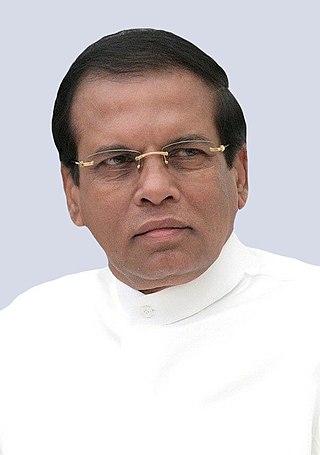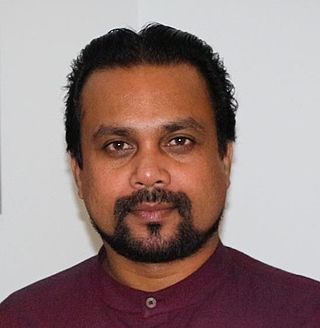Related Research Articles

Mahinda Rajapaksa is a Sri Lankan politician. He served as the President of Sri Lanka from 2005 to 2015; the Prime Minister of Sri Lanka from 2004 to 2005, 2018, and 2019 to 2022; the Leader of the Opposition from 2002 to 2004 and 2018 to 2019, and the Minister of Finance from 2005 to 2015 and 2019 to 2021. He has been a Member of Parliament (MP) for Kurunegala since 2015.
General Ranjan Wijeratne was a Sri Lankan planter and politician. He served in the Premadasa cabinet as Minister of Foreign Affairs and then Minister of Plantation Industries, while holding the office of State Minister for Defence.

TamilNet is an online newspaper that provides news and feature articles on current affairs in Sri Lanka, specifically related to the erstwhile Sri Lankan Civil War. The website was formed by members of the Sri Lankan Tamil community residing in the United States and publishes articles in English, German and French.
The Tamil Eelam Air Force or Sky Tigers was the air-wing of the Liberation Tigers of Tamil Eelam (LTTE), who used it against the Government of Sri Lanka. They also called themselves the Tamileelam Air Force (TAF). Though the existence of the Sky Tigers had been the subject of speculation for many years, the existence of the wing was only revealed after an attack in March 2007, during Eelam War IV.

The Canadian Tamil Congress is a Canadian non-profit organization that serves Tamil Canadians since October 2000 and has 11 chapters. The objectives of the Canadian Tamil Congress are: to promote the participation of Tamil Canadians in activities of local, regional, provincial and national importance; to uphold the Canadian values of human rights, multiculturalism, religious and cultural diversity, pluralism, and volunteerism; to champion for equal rights and in particular, gender equality; to support the cultural and political aspirations of Tamils. The organization also promotes the study and knowledge of Tamil language, culture and history within the Canadian context. The CTC also works on adjustment/settlement issues.

Shanmuganathan Ravishankar was a leading member of the TOSIS, the intelligence wing of Liberation Tigers of Tamil Eelam (LTTE), a separatist Tamil militant organisation in Sri Lanka.

Lasantha Manilal Wickrematunge was a high-profile Sri Lankan journalist, politician, broadcaster and human rights activist who was assassinated in January 2009.
Between 2008 and 2009, major protests against the Sri Lankan Civil War took place in several countries around the world, urging national and world leaders and organisations to take action on bringing a unanimous cease fire to the Sri Lankan Civil War, which had taken place for twenty-six years. Tamil diaspora populations around the world expressed concerns regarding the conduct of the civil war in the island nation of Sri Lanka. The civil war, which took place between the Sri Lankan Army and the separatist group Liberation Tigers of Tamil Eelam is believed to have killed over 100,000 civilians. Protesters and critics of the Sri Lankan government that triggered a culturally based civil war to be a systematic genocide and ethnic cleansing of the Sri Lankan Tamil minority in Sri Lanka.

Maithripala Yapa Sirisena is a Sri Lankan politician who served as the seventh President of Sri Lanka from 9 January 2015 to 18 November 2019. Sirisena is Sri Lanka's first president from the North Central Province of the country and does not belong to the traditional Sri Lankan political elite. He is currently a member of parliament from Polonnaruwa.

Weerasangilige Wimal Weerawansa is a Sri Lankan politician, Member of Parliament and current leader of the National Freedom Front (NFF). Weerawansa has served many cabinet positions, including Minister of Industries from 2020 to 2022, Minister of Small and Medium Business and Enterprise Development, Industries and Supply Chain Management from 2019 to 2020, Minister of Housing and Social Welfare in 2018 and the Minister of Construction and Housing from 2010 to 2015.
Facebook is a social networking service that has been gradually replacing traditional media channels since 2010. Facebook has limited moderation of the content posted to its site. Because the site indiscriminately displays material publicly posted by users, Facebook can, in effect, threaten oppressive governments. Facebook can simultaneously propagate fake news, hate speech, and misinformation, thereby undermining the credibility of online platforms and social media.
Fake news in India refers to misinformation or disinformation in the country which is spread through word of mouth and traditional media and more recently through digital forms of communication such as edited videos, memes, unverified advertisements and social media propagated rumours. Fake news spread through social media in the country has become a serious problem, with the potential of it resulting in mob violence, as was the case where at least 20 people were killed in 2018 as a result of misinformation circulated on social media.

Rajapakse Konara Mudiyanselage Bilesha Yudhanjaya Bandara Wijeratne is a Sri Lankan science fiction author, activist and researcher, classified as part of a new wave of South Asian science fiction writers. His work has appeared in Wired, Foreign Policy and Slate. His novel The Salvage Crew has been lauded as one of the best science fiction and fantasy books of 2020.

On 21 April 2019, Easter Sunday, three churches in Sri Lanka and three luxury hotels in the commercial capital, Colombo, were targeted in a series of coordinated ISIS-related terrorist suicide bombings. Later that day, two smaller explosions occurred at a housing complex in Dematagoda and a guest house in Dehiwala. A total of 269 people were killed, including at least 45 foreign nationals, three police officers, and eight suicide bombers. An additional 500 were injured. The church bombings were carried out during Easter services in Negombo, Batticaloa and Colombo; the hotels bombed included the Shangri-La, Cinnamon Grand, Kingsbury and Tropical Inn. According to the State Intelligence Service, a second wave of attacks was planned, but was prevented due to government raids.
Sri Lanka faced a spate of coordinated bombings in churches and hotels on Easter Sunday 2019. The country was earlier involved in a three-decade internal conflict between the State and the Liberation Tigers of Tamil Eelam – a proscribed terrorist organization – that ended in May 2009. The Easter attacks, the largest since the war, were carried out by extremist Islamists. The chaos surrounding the attacks was compounded by the viral spread of fake news aimed at the minority Muslim community in the country. This led to a state shutdown of social media to prevent anti-Muslim mobs from organizing in the aftermath of the attack. The government also decided to criminalize hate speech and fake news in June 2019 to prevent a reoccurrence of violence.
Internet censorship in Sri Lanka is conducted under a variety of laws, judicial processes, regulations and more. In Sri Lanka, internet censorship is mostly executed by blocking access to specific sites as well as the use of laws which criminalize publication or possession of certain types of material, including regulations against terrorism and pornography.

The role of open-source intelligence (OSINT) in response to the 2022 Russian invasion of Ukraine has attracted significant attention.

The 2022 Sri Lankan protests were a series of mass protests that began in March 2022 against the government of Sri Lanka. The government was heavily criticized for mismanaging the Sri Lankan economy, which led to a subsequent economic crisis involving severe inflation, daily blackouts, and a shortage of fuel, domestic gas, and other essential goods. The protesters' main demand was the resignation of President Gotabaya Rajapaksa and key officials from the Rajapaksa family. Despite the involvement of several opposition parties, most protesters considered themselves to be apolitical, with many expressing discontent with the parliamentary opposition. Protesters chanted slogans such as "Go Home Gota", "Go Home Rajapaksas", and "Aragalayata Jaya Wewa". Most protests were organized by the general public, with youths playing a major part by carrying out protests at Galle Face Green.

The 2022 Sri Lankan political crisis was a political crisis in Sri Lanka due to the power struggle between President Gotabaya Rajapaksa and the people of Sri Lanka. It was fueled by the anti-government protests and demonstrations by the public due to the economic crisis in the country. The anti-government sentiment across various parts of Sri Lanka has triggered a state of political instability that is unprecedented in the nation's history.
References
- 1 2 3 4 5 6 7 8 9 Christopher, Nilesh (21 June 2022). "Meet the fact-checkers decoding Sri Lanka's meltdown". Rest of World. Retrieved 9 July 2022– via Nieman Lab.
- ↑ Isaac's, Lewis (8 May 2019). "These are the false news stories that prompted a social media ban in Sri Lanka". Special Broadcasting Service .
- ↑ "Safra Anver". LinkedIn . Retrieved 9 July 2022.
- ↑ Ghoshal, Devjyot; Jayasinghe, Uditha (6 April 2022). "In stunning reversal, protests leave Sri Lanka's ruling dynasty teetering". Reuters . Retrieved 9 July 2022.
From beachside towns in the south to the Tamil-speaking north, more than 100 demonstrations have broken out across the island nation since last week, according to the WatchDog research collective.
- ↑ ""The masses and my voters are with me. They will vote for me again at the next elections. I am confident of winning. These protestors were always against me" - MR". Daily Mirror (Sri Lanka) . 27 April 2022. Retrieved 24 July 2022.